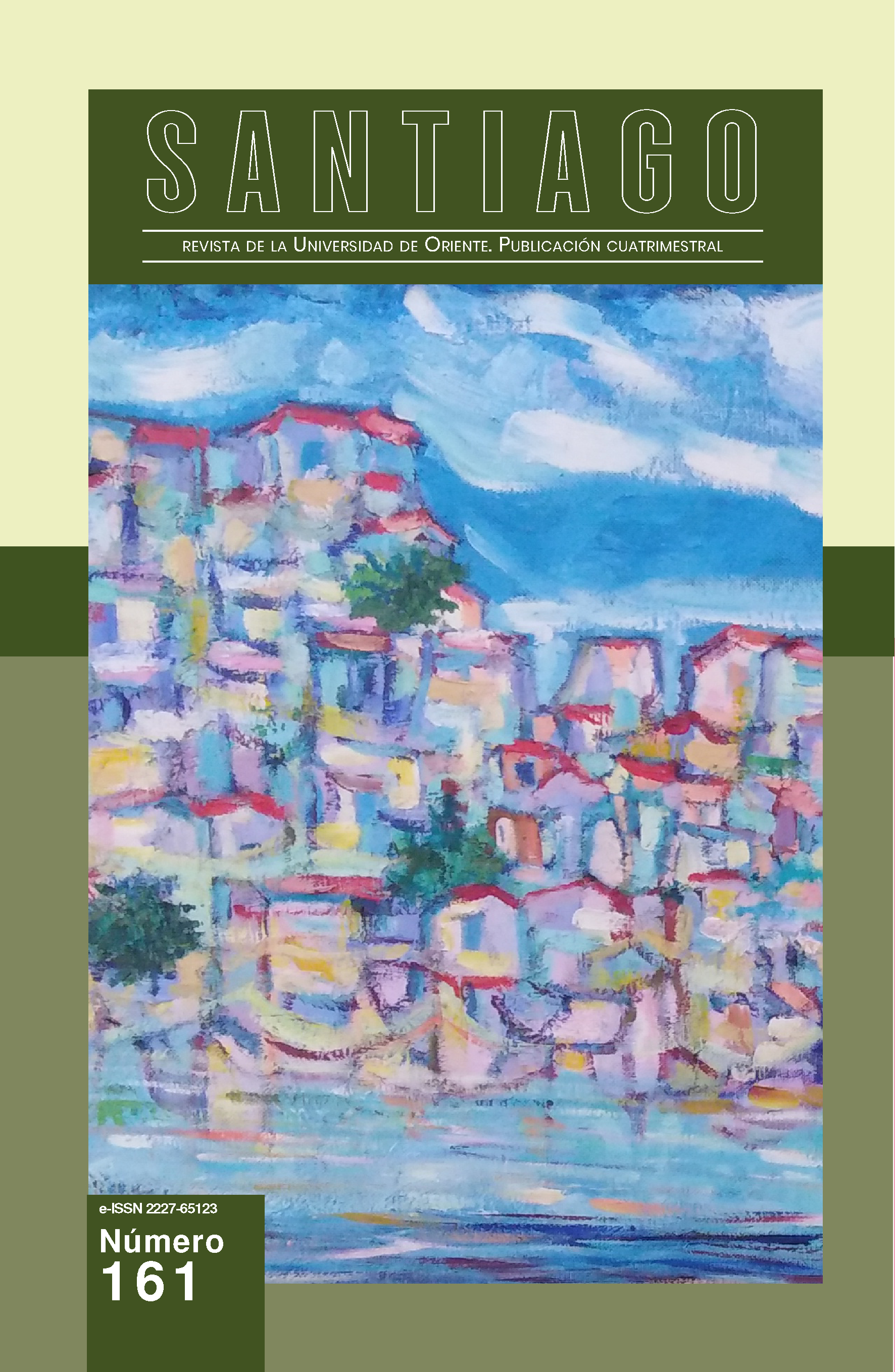Valoraciones sobre el proceso formativo del pensamiento científico desde una intencionalidad axiológica
Palavras-chave:
Educación, valores, formación, sistema, sociedadResumo
El siguiente trabajo tiene como objetivo valorar los elementos fundamentales gnoseológicos y cosmovisivos a tener presente en todo análisis del proceso formativo del pensamiento científico desde una intencionalidad axiológica. Para ello se emplearon los métodos holíticos sistémicos y la metodología investigativa de la cienciometría en el contexto de propuestas tales como los estudios del conocimiento científico en el proceso educativo, la gestión del conocimiento científico desde la intencionalidad y el paradigma conocido como análisis de dominio en el campo dela axiología cognitiva científica. Se valoraron ideas de pensadores sobre estas temáticas, sus aportes y limitaciones cosmovisivas. Especial atención se tiene en esta investigación los elementos teóricos epistémicos en el estudio de los valores a nivel de la conciencia individual, las relaciones entre el objeto y el sujeto cognoscente y la función de la escuela de enseñar a pensar en todo proceso formativo del pensamiento científico.
Referências
Akcated, M. (2018). Advantages and challenges associated with augmented reality for education: A systematic review of the literature. Educational Research Review, 20, 1–11. http://dx.doi.org/10.1013/j.edurev.2018.11.002
Alain, K. (2016). An overview of game-based learning in building services engineering education. European Journal of Engineering Education, 41(2), 204-219. http://doi.org/10.1080/03043797.2015.1056097.
Abello, R. y Yahemn, B. (2018). Estrategias de formación Investigativa. Revista Universidad & Sociedad, 4(6), 290-309. http://rus.ucfs.edu.cu
Allaice, M. (2019). La formación científica. Revista Mexicana de Investigación Educativa, 41, 173-183. http://acdc.sav.us.es/pixelbit/images/stories/p41/13.pdf
Addine, F. (2020). La formación científica, Revista Educativa, 26, 112-125. http://acdc.sav.us.es/pixelbit/images/stories/p41/13.pdf
Árraga, M. (2003). La formación para la investigación. Revista Educación, 11, 23-42. http://astd.sapr.us.es/pixelbit/images/stories/p31/11.pdf
Báxter, E. (2017). Cuándo y cómo educar en valores. Revista Universidad & Sociedad, 4(6), 281-319. http://rust.ucf.edu.cu
Bornmann, G. (2019). The new Excellence Indicator in the World Report of the SCImago Institutions Rankings. Journal of Informetrics Epistemus. 5(1), 34-53. https://doi.org/10.21932/epistemus.5.3244.1
Bunge, M. (1981). La investigación científica, Revista Cognición y Cultura, 7(5), 27-86. https://doi.org/10.21932/cognicion.9.321.3
Callon, M. K., Christoff, K., Panitz, D., De Rosa, E., y Gabrieli, J. (2019). Cienciometría: la medición de la actividad científica: de la bibliometría a la vigilancia tecnológica. Revista Cognición y Educación, 17(3), 15-30. http://dx.doi.org/10.5565/rev/qpsicologia.1280
Cabero, J., y Barroso, J. (2016). The educational possibilities of Augmented Reality. Journal of New Approaches in Educational Research, 5(1), 44-50, https://doi.org/10.7821/naer.2016.1.140
Cartagena Beteta, M., Santana González, Y., Revuelta Domínguez, F. I., & Pedrera Rodríguez, M. I. (2023). Creencias Docentes en la Integración Curricular de las TIC en Educación Religiosa en Perú. Revista Universidad y Sociedad, 15(1), 185-198.
Codina, T. (2015). Axiología y educación. Quaderns de Psicologia, 22(9), 27-35. http://dx.dort.org/19.q2133/rtld/educacion.1579
Colces, M. (2011). Sobre Colciencias. La dimensión axiológica de la Psicología Social educativa. Revista latinoamericana de psicología, 24(2), 17-22.
Cutcliffe, S. H. (2003). Ideas, máquinas y valores: los estudios de ciencia, tecnología y sociedad.
Revista Psicoperspectivas, 15, 111-138.
Curtis, R. (2017). De como investigador: ¿reto y necesidad? Revista Itinerario Educativo, 17(3), 15-30. http://dx.doi.org/10.5532/rev/tqpsicologia.11280
Córdoba, M. E. (2016). Reflexión sobre la formación investigativa de los estudiantes de pregrado. Revista Virtual Universidad Católica del Norte, 47, 20-37. http://revistavirtual.ucn.edu.co/index.phpt/RevistaUCN/articl e/view/740/1266
George Reyes, C. E., y Avello-Martínez, R. (2021). Alfabetización digital en la educación. Revisión sistemática de la producción científica en Scopus. Revista de Educación a Distancia (RED), 15(2), 11-23. https://doi.org/10.60128/red.444751
Santana González, Y., Torres Rodríguez, O., Rodríguez Martínez, Y., Silva Albear, Y., & Oris Martínez, L. (2022). Acciones de atención psicológica durante la covid-19 a través del chat “Santiago se Levanta”. Revista Conhecimento Online, 1, 189–212. https://doi.org/10.25112/rco.v1.2737 en: https://periodicos.feevale.br/seer/index.php/revistaconhecimentoonline/article/view/2737 2022
Torres, C. (2011) Elaborar conocimientos científicos en el Aula. Quaderns de Psicologia, 11(4), 12-19. http://dx.doi.org/11.5366/rev/qpsicologia.1280
Downloads
Publicado
Edição
Seção
Licença
Copyright (c) 2023 Rosa Romelia Posso-Martínez, Ana Victoria Knaggs-Maymir, Jorge Silva-Cutiño

Este trabalho está licenciado sob uma licença Creative Commons Attribution-NonCommercial-NoDerivatives 4.0 International License.
CC Reconocimiento-NoComercial-SinObrasDerivadas 4.0





.jpg)
_de_logo.jpg)
















